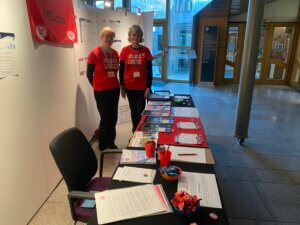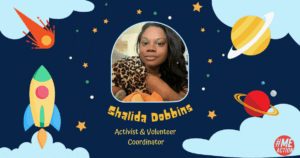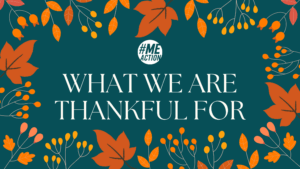UPDATE: Now you can also listen to an audio-recording of Christina’s personal essay on Soundcloud.
Editor’s Note: This week we have another opinion piece by one of our #BedFest artists, Christina Baltais. Be sure to check out her #BedFest artwork. You can connect with other #Bedfest creatives here and find support from other people recently diagnosed with ME here.
Transitioning from
an Abled Life
By Christina Baltais
Listen on SoundCloud
When a sudden and unexpected illness catapulted my life into a completely different path, life as I had come to know it, was irrevocably changed. Prior to this, I thrived on the fast paced career trajectory that our Western ableist society promotes, rewards, and idolizes. I was by all definition, a “high functioning” abled bodied person who believed “success” came with hard work. During the fall of 2006, I was diagnosed with myalgic encephalomyelitis (ME). ME is more commonly known as chronic fatigue syndrome (CFS). The latter name does not adequately encompass the multitude of daily severe symptoms and debility. It’s akin to describing a catastrophic tsunami as scattered showers. Now when I worked hard and even harder, my body became sick and even sicker. I would later be formally diagnosed with chronic Lyme’s disease a decade later. Nothing could have prepared me for the unraveling of my life, thoughts, and beliefs around my relationship to my body, others, and to life.
[pullquote align=”full” cite=”” link=”” color=”” class=”” size=””]We are wellness warriors, with very little pomp and circumstance.[/pullquote]
Phoenix Rising?
The art and practice of letting go of the abled life isn’t a tidy flame, from which an exquisite fully realized phoenix emerges. It feels more like a perpetual inferno, where a singed chicken clamours together its haggard parts searching for the instruction manual on how to do life. The flames have names: grief, despair, anger, blame, shame, fear. Grief for a life once lived, for a job once held, for a social life once a part of, for a body without limitation. Despair for the uncertainty of your prognosis, if you’re quality of life will ever return. Anger for the randomness of it all, and for your life not matching the narrative in your head of what life was “supposed to be.” Blame…maybe it was all the excessive drinking…did I have too many negative thoughts? what qualifies as a negative thought anyway? Alas, I could go on. Then there’s the shroud of shame. It makes you feel like it’s not okay to be having this experience and condones hiding your disability at all costs. You feel a disabled body is unworthy of love, not of value. Fear permeates everything. It tells you on your worst days you’re never going to feel better, and life will be forever reduced to this deemed “smaller version of yourself.” It was chaos navigating this new reality. I was barely surviving, not thriving; clearly I had a long ways to go.
Doing Less, Being More
You or others may perceive resting as “doing nothing” in our very production oriented society; where the value of ones body is directly correlated to its output. This conditioned dehumanizing framework establishes a widespread erasure of all marginalized bodies that don’t exist in this paradigm. That’s why losing a job can be a very emotionally painful experience, not to mention an identity crisis and questioning of one’s life purpose. These disturbing ingrained beliefs impact self esteem, self worth, and breed isolation and shame. Recognize your life’s purpose is for you to define, and is not a cumulation of your body’s productivity. Your value is intrinsic by virtue of existing as a living breathing human being.
Losing a job can also affect access to housing, food, shelter, and healthcare. Everything is impacted when a severe chronic illness emerges. One thing resilient to it, is the essence of who you are. What a body is capable of doing, is not who you are. An abled body ’s endeavours is but a reflection, extension, and expression of who one is. Who you are is a state of being that never changes, irrespective of yours body’s physical capacity. If you were once a dancer and no longer dance, you are still a dancer at heart. The personal attributes and passion that made prior labours possible, are still alive within you.
Your lifestyle will likely look very different from those around you and to your previous life. It may mean strategically planning outings and events with accommodations and accessibility needs. Changes in pacing and commitments will help when rationing energy supplies; with an emphasis on quality over quantity. Extended rest for days, weeks, months, or even years may be a requirement depending on the severity and fluctuation of your symptoms. There is personal growth and transformation that emerges from long periods of rest, not to mention the potential shifts in health. Facing a chronic illness everyday is a sheer act of resistance, perseverance, courage, strength, and patience. This beautiful growth is where the silver lining of all chronic disease lays. The mental pep talks I give to my body are built from the scaffolding of pep talks I once gave myself before swimming competitions. The stark difference is how validated, celebrated, and recognized as worthy one experience was, vs. how unseen, unheard, perceived as less-than, and undesired the other has felt. The state of mind and being in both were similar, but from two completely different realities.
Everybody and Every Body is Valid
Resting and healing is enough; healing the body is a valid life and a valid reason to stop and take care of yourself. In most cases, it is not a choice to stop, but is the only option you have. Whether that is for a year, or whether it is life long, it is always a difficult transition. A few reminders: You do not need anyone else’s approval or permission. You just as you are, are enough and will always be enough. Your body just as it is, is, and will always be enough. You only have one precious body, and loving it fiercely is a priority. An ableist society says otherwise, missing out on all the valid contributions of the vast and varied talents found in our disabled communities.
Creating Safety
Creating a nurturing safe space that validates your experience is crucial in fostering self love, and healing. Illness brazenly illuminates everything not working in your life, especially when it comes to relationships. This resulted in me personally ending relationships where boundaries were not respected. Red flags can include:
– apologizing (for your body, for having a bad day, for having to cancel plans)
– feeling shame or blame when you are unable to do things “like everyone else”
– accommodations/access not considered and being left out
– needing to constantly “prove” your illness
– referenced as a burden/inconvenience
– your illness is perceived as “negative” and talking about it is discouraged
– pressured to go back to work despite severe symptoms
– assumptions (if you “look good”, or are perceived as “doing good” at one moment in time, then this represents you 100% of the time)
This list is by no means extensive. If you have to leave your chronic illness at the door in order to enter, then it’s not worth going into. Your illness is not you, nor does it solely define you, or needs to the the focal point of every conversation. The problem arises when other refuse to acknowledge its impact on significant aspects of your life. Illness also illuminates the most important things in life: authentic healthy human connection. This includes finding a support system whether online, in your community, through friends and family, or finding an accessible therapist. Try to find others going through what you’re going through to break the isolation—remember you are not alone, and know there are others out there experiencing the exact same thing you are.
Feeling all the Feelings
Being human involves recognizing and feeling all of our feelings (anger, sadness, grief, despair, frustration) in order to move and heal through them. True emotional health is navigating the emotional spectrum of life, giving each space and a seat at the table when they arise. There is no spiritual bypass that transcends them, nor any Louise L. Hay affirmation antidote. Any one feeling is not innately “positive” or “negative”, it’s about overall balance. If you’re experiencing a low day, give yourself permission to feel whatever you’re feeling. Keep your thoughts about your feelings and body as kind and as gentle as possible. Having a routine for harder days can be a helpful coping strategy. It can be as simple as posting signs on your wall by your bed (mine say “You are perfect just as you are” and “Be kind to yourself”). It can look like building a cocoon nest in your bed and putting on your favourite album. Creating—art, music, whatever is in the scope of your ability and works for you to help process your experience.
These are a few things that have helped me adjust to my “new normal” for this moment in my life. Living with chronic illness at any point in your life is no easy feat. We are wellness warriors, with very little pomp and circumstance. However vast and varied our experiences are, I hope we can see, hear, and honour each other stories and stand in solidarity together when needed.






5 thoughts on “Transitioning from an Abled Life”
Very beautifully and clearly described. Thank you Christina.
Christina,
So beautifully written and inspiring. I have made a hard copy and will read it often. Having suffered with ME/CFS for 48 years, I need all the encouragement and affirmation I can get. Thank you.
This brought me joy listening to your words at night in a quiet, dark room. Thank you for taking the time to record it.
Thank you for writing this, so eloquently written. Currently laying in bed trying to come to terms with another relapse, reading this brought light. Xx
So poignant and relevant to my life as I begin to navigate the rough waters of life with ME. So many perfect statements but the three that stand out most for me right now are the ones,
“There is no spiritual bypass that transcends them, nor any Louise L. Hay affirmation antidote.” and,
“It’s akin to describing a catastrophic tsunami as scattered showers.” and,
“Red flags can include accommodations/access not considered and being left out.”
Thank you so much Christina, for your elegant words written so perfectly. I have listened to your recording so many times and I will keep listening because of the hope and acceptance you offer.
Comments are closed.